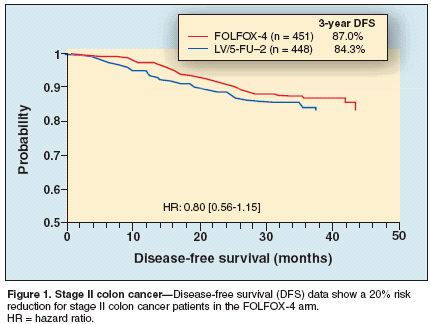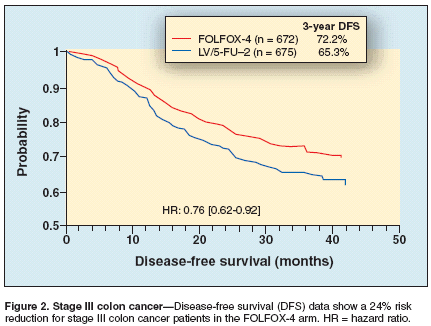MOSAIC Data Support FOLFOX- 4 Use in High-Risk Stage II Colon Cancer
The 30 reports in this special supplement to Oncology News International represent highlights of ongoing major clinical trials and new research presented at ASCO 2004 regarding state-of-the-art chemotherapeutic management of gastrointestinal and other cancers. Important developments in capecitabine as adjuvant therapy, novel targeted agents, and new combinations are discussed.
BOURNEMOUTH, UnitedKingdom-Treatment with the FOLFOX-4 regimen (loading dose of fluorouracil[5-FU] followed by infusional5-FU, leucovorin [LV], oxaliplatin[Eloxatin]) may be preferable to 5-FU/LV in high-risk stage II colon cancerpatients, investigators for a retrospectivemulti-country study haveconcluded (abstract 3619).The European-Israeli study is a prespecifiedsubgroup analysis of MOSAIC(Multicenter International Studyof Oxaliplatin/5-FU/Leucovorin in theAdjuvant Treatment of Colon Cancer),the recent randomized 2,200-patient trial that established FOLFOX-4 as the first regimen to improve 3-yeardisease-free survival versus standard5-FU/LV (N Engl J Med 350:2343-2351, 2004).Strong DFS Benefit
While adjuvant chemotherapy forstage II colon cancer remains controversial,the MOSAIC subgroup analysisprovides more evidence that such atreatment strategy is warranted. Forstage II patients with at least one riskfactor, disease-free survival at 3 yearswas 84.9% for FOLFOX-4 vs 79.8%(hazard ratio [HR] 0.72, relative riskreduction 28%).The data were strong enough to suggestFOLFOX-4 treatment for stage IIpatients with adverse prognostic factors,who "still derive risk reductionsfrom the FOLFOX-4 therapy," said leadinvestigator Tamas Hickish, MD, ofDorset Cancer Center, Bournemouth,United Kingdom."For clinicians, this means if theyhave a stage II patient with adverseprognostic factors-venous invasion,poor differentiation, or bowel obstruction,for example-they may wish toconsider whether that patient shouldbe treated with FOLFOX 4," he added."The objective is to minimize that patient'srisk of disease recurrence, andFOLFOX-4 appeared to do that."Prior Studies Conflicting
Adjuvant chemotherapy for stageII (Dukes' B2) colon cancer remainscontroversial, with conflicting data reported.A 1999 pooled analysis of fourNSABP (National Surgical AdjuvantBowel Project) trials, including 1,565stage II patients, concluded that riskof death was similar for stage II and III,suggesting it is appropriate to includestage II patients in adjuvant trials.On the other hand, a 1999 pooledanalysis of the IMPACT B2 (InternationalMulticentre Pooled Analysis ofB2 Colon Cancer Trials), including1,600 stage II patients in five randomizedtrials, concluded there was nosignificant difference in absolute riskof death at 5 years for patients treatedwith 5-FU-based chemotherapy vssurgery alone.


Favorable Benefit vs Risk
Most recently, a Mayo Clinic analysis(J Clin Oncol 22(10):1-10, 2004),including pooled data on 3,302 patients,concluded that stage II patientsdo derive a benefit, albeit to a lesserextent, than stage III patients.The MOSAIC trial, publishedaround the same time as ASCO 2004,assessed adjuvant therapy in both stageII and III patients. For the entire intent-to-treat population, the probabilityof 3-year disease-free survivalwas 78.2% in the FOLFOX-4 arm, vs72.9% in the 5-FU/LV arm (HR 0.77,95% confidence interval, 0.65-0.91;P = .002).While MOSAIC was not poweredto look at differences in recurrencebetween stage II and III colon cancerpatients, further analysis presented atASCO suggests adjuvant chemotherapyprovided a 20% reduction in riskof recurrence for the stage II patients,compared with a 24% risk reductionseen in stage III patients (see Figures 1and 2). That, coupled with a low incidenceof major safety events "reflectsthe favorable benefit-risk of FOLFOX-4 in this population," investigatorswrote.The finding that high-risk stage IIpatients have a relative risk reductionof 28% illustrates the heterogeneity ofthis patient population, and suggestsrisk factors should be taken into accountwhen treatment options are considered:"By stratifying on potentialrisk factors for relapse in this population,future studies will permit a betterdefinition of the population," investigatorssaid.
How Supportive Care Methods Can Improve Oncology Outcomes
Experts discussed supportive care and why it should be integrated into standard oncology care.